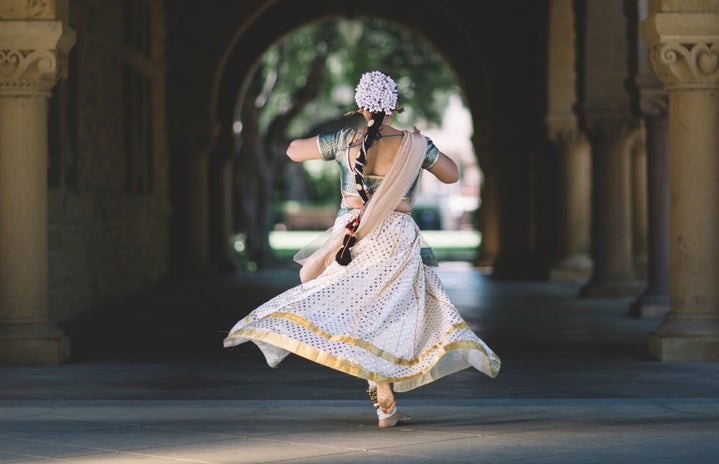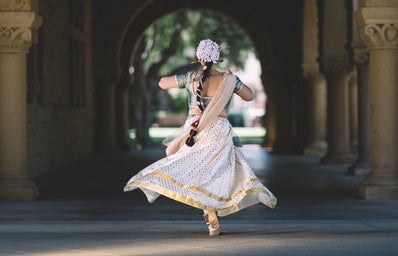Edited by Kavya Mittal
You know how they say a dancer first learns to dance and then to walk? And that they are ‘born’ as dancers? Well for some of us, we are ‘born’ with two left feet.
I wouldn’t say I was a terrible dancer as a child, but I was nowhere close to being a prodigy or even a ‘natural’ dancer. My journey with dance started, like many other Indian girls, because my mother wanted me to be a dancer. And having a mother who herself is an extremely talented dancer, it seemed natural for dance to be my destined area of expertise. I was put into Kathak, a classical indian dance, at the tender age of six. But even as a child, I struggled to love dancing, it was a compulsory part of my schedule; at the start at least. I yearned to play with my friends instead of focusing on dhaa dhinn dhinn dhaa. My tiny hands struggled to maintain posture.
My relationship with dance was rocky for a long time. I often alternated between basking in the glory of validation I received from a young age, to forcing myself to go to a class where I felt extremely lonely. However, when I was 14 I had to take a break from dancing for a year due to personal medical reasons. Initially I felt relieved that my toxic relationship with dance had ended. But sometimes when you distance yourself and look at things from a new perspective, you truly realise their value.When I stopped dancing, is certainly the time I learnt the true meaning of ‘Distance makes the heart grow fonder’. I missed the loud rhythmic volume of ghungroos as we practiced our foot movements in sync. I missed the sheer excitement and rush of being backstage right before a big performance, peeking from the curtains and finally going into the bright spotlight to perform in front of hundreds of excited eyes. I missed the beautiful attire, the fake hair styled perfectly in place with a million hairpins and the constant fear of my ghungroos falling off during an important exam. I could finally relate to the notion of dance that everyone around me had romanticized for all my life.
When I finally rejoined class after a year, it seemed like my whole dancing world had been reformed. I made so many incredible friends who continue to be my strong support system even today. I learnt the art of performing for yourself more than performing for an audience. And not to use the word lightly, but in a way, dance became therapeutic for me. And when I moved to college, my dancing journey came across an unprecedented milestone. I had to stop my official training. But still, that did not stop me from pursuing my passion. I still try to dance whenever I can and train when I am back home. For the feeling I get while dancing, is something I simply cannot put into words.
I’ve enjoyed the comforts of my house, friends, family and surroundings for years together and the gratitude for everything that I have will always be a constant in my life. But I have remained in my comfort zone for far too long. I used to live in my small bubble of familiarity, and although it has always made me happy, it has never helped me grow.
But now, it’s time to pop this bubble and think outside the box. The only way I can grow is if I gain exposure. And that will help me develop as a whole. Today, I’m so glad that I am a ‘dancer’. Because even though dance is something I grew into, it is a big part of my life, and who I am. My mother always says, I have a certain grace in my walk and dance in every step I make. I’ve become the kind of person who is happiest when she is dancing and can literally dance at any point of time. My journey and relationship with dance has helped me grow and been a big contribution to my mental health. There is nothing that brings me as much joy as dancing, be it classical dance, western, festive or simply street style.
One big part of my dance journey was realising that I do not need to be ‘perfect’ at it or prove to anyone that I am an expert dancer. I simply have to enjoy it and that is all that matters. The influence of the capitalistic society that we live in and the need to be hyper productive 24/7 affected me later in life when I tended to prioritize academics over dance. But I have realised that doing something you love, purly for the sheer joy it gives you is something we often forget, ignore and take for granted. Although not solely responsible for its benefit, my mental health journey was definitely complimented by my dance journey. It has helped and guided me along every step of my life and has been one of the biggest influences in my life. As I write about this personal journey today, my emotions towards dancing are stronger than ever before. And I hope to continue on this journey and simply dance, for the joy of dancing.



